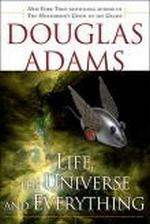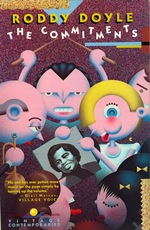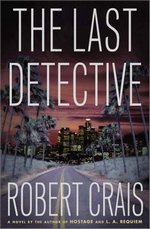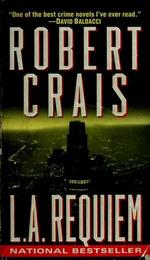 L.A. Requiem by Robert Crais
L.A. Requiem by Robert Crais
Series: Elvis Cole, #8Mass Market Paperback, 539 pages
Published October 3rd 2002 by Pocket
Read: September 24 – 25, 2014
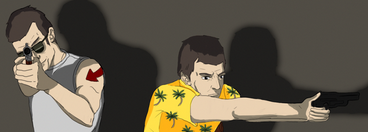
I know that I’ve read this one at least twice previously, but you wouldn’t have been able to prove it last week when I started my re-read of it. I’d spent the last few weeks while planning this series (and probably years before it), convinced that the events of The Last Detective happened in this book — and that the back story revealed here was revealed a couple of books earlier.
Not only that, I’d forgotten this was where we met John Chen! I’d even forgot that he was on the horizon! Sure, John Chen is a despicable, slimey guy. But there’s something about him I liked — even here, before any of his redeeming qualities are found (developed?), there’s something about John that’s likeable. He’s a creep, but he’s Pike’s creep.
Still, I’d clearly forgotten just about everything meaningful about this novel — at least as far as plot goes. I remember what I learned about Pike (but, as I said, thought I learned it elsewhere). Making this a lot of fun to reread. Which is, I guess, the whole point of rereading.
Anyway, to the book itself:
One of my all-time favorite movies is Midnight Run, if you haven’t watched it, shame on you. Really. There’s no excuse. Go rectify that situation. As you’ll recall, Jonathan Mardukus torments the bounty hunter bringing him back to LA with the question, “Why are you so unpopular with the Chicago police department?” Throughout this series, astute readers have likely been asking a similar question: “Why is Joe Pike so unpopular with the Los Angeles police department?” — at least I have (which is not to say you’re an astute reader if you haven’t been asking the question I have — clearly, you’re astute. And good looking. With a great sense of humor). Except for the times when the detectives have hard to travel out of town, we’ve seen animosity to outright hatred in the LAPD’s reaction to Joe (with the exception of Det. Angela Rossi). In these pages, we finally learn why (it’s an understandable, yet, mistaken reason — naturally). But we learn a lot more about him, here, too: the foundation for his obsession with keeping his jeep clean, why he’s driven in many of the ways that he is, and more — but this isn’t just a series of flashbacks — all we learn about Joe serves the main story as well as the character.
For a little change of pace here in book 8, Joe Pike brings in the client. In this case, it’s the father of a woman Joe dated back when he was a police officer, things ended badly, but not so badly that Frank Garcia has lost any respect for Joe. So when Karen goes missing one day, and the police won’t help him yet, Frank turns to Joe for help. Joe, naturally, brings Elvis along for this investigation.
The events that turned Pike into LAPD’s Most Hated are related to the outcome of this case — and not just because it makes every cop willing to believe the worst in Joe and not look too hard for an alternative explanation when Joe becomes a suspect. His partner jailed, the police hostile to any efforts to seek another suspect, the Karen Garcia case becomes Elvis’ most personal case yet (until the next book).
The various police officers and detectives involved in this book are just horrible — bordering on cartoonishly bad at the beginning. Not necessarily bad at their jobs, just bad human beings. Thankfully, Crais isn’t that kind of writer, and you learn there’s actually a reason for these men and women to act this way. Garcia’s able to use his political clout to force the detectives assigned to the case to let Elvis observe them, read their reports and whatnot. Which is resented (and not just because of Joe), particularly by the detective who’s forced to act as his liaison, Samantha Dolan. Dolan eventually softens to a degree, and her relationship with Cole acts as a precursor/template for another coming soon in Elvis’ life.
I’m going to break my anti-spoiler policy here, and rant a bit. If you want to read it, use your mouse to select the following paragraph:
Lucy, Lucy, Lucy — I am so disappointed in you. Of course Elvis is going to choose to help Joe here. Of course, he’s going to put his life on the line for his partner (who’s saved his life more than once). Of course, Elvis is going to bend the law (at best), going to pull out all the stops to find the killer and save Joe. What did you think he was going to do? Stop being Elvis? How did you two meet? What lengths did Elvis go to in order to help out these complete strangers and the woman who lied to him and fired him? And then what did he do for those kids, after you forced him to help? Not to mention the case that got you your job in L.A.? I get it, you’re in a vulnerable place, you’ve changed your whole life thanks to Elvis and you feel like he owes you a bit. But before you moved to L. A. you knew who he was. You knew the kind of man he was and what kind of dangerous work he did. I started disliking Lucy here, and that only grows in the next book (even if I sympathize with her more there), so that when she shows up in The Forgotten Man I don’t even want to see her.
Nothing is simple about this case — not the mystery, not the motive for the killings, not the various motives for the investigators, not the lives of those touched by the crimes/criminals/investigators. It’s all complicated, messy and very human.
In the end, this is Crais’ masterpiece. Which isn’t to say that he hasn’t written some very satisfying and enjoyable books after this — many of which I like more. But nothing’s as good as this one. This brings us to a new stage in the Cole books — one that continues to this day. I might contrast the two stages a bit more in the weeks to come (maybe during/after The Forgotten Man or maybe to go along with The Promise), almost making them two different series. And yes, I miss the old Elvis — but that’s not to say there’s a problem with the new one, it’s just noting a difference. It’s haunting, it’s disturbing, and will affect any reader that has an emotional connection to the partners. Really well done. Oh, and as a bonus, the last 3 or 4 pages are just gorgeous — probably the most “writerly” writing that Crais has done yet.
—–

—–
Drawing by Kirsty Stewart, chameleonkirsty on deviantART, used with permission.
 The Absconded Ambassador
The Absconded Ambassador I really don’t have much more to say about the audiobook that I didn’t say about the original, but I wanted to get something up — so if this seems largely familiar, it is. But not entirely …
I really don’t have much more to say about the audiobook that I didn’t say about the original, but I wanted to get something up — so if this seems largely familiar, it is. But not entirely …


